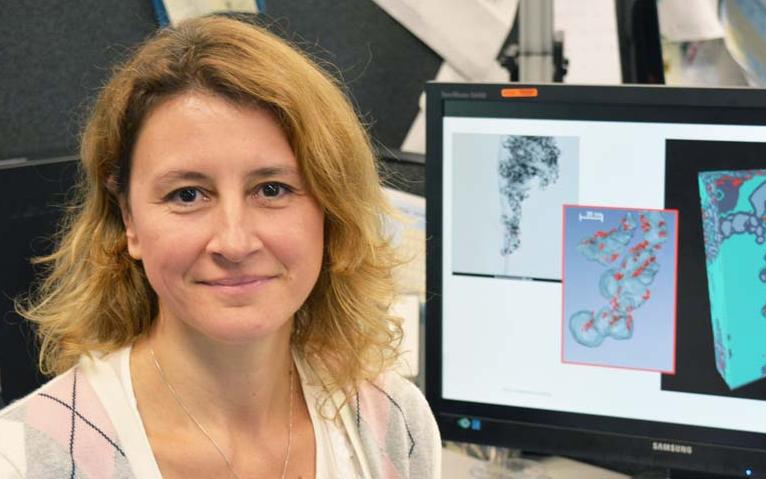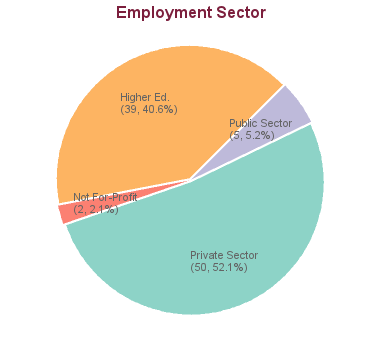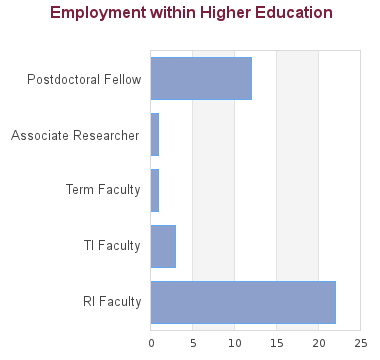
Jasna Jankovic
Job Title
Assistant Professor
Employer
University of Connecticut

Review details about the recently announced changes to study and work permits that apply to master’s and doctoral degree students. Read more
Chemical and Chemical & Biological engineers create and develop processes to change raw materials into the products that society depends on; food, chemicals, fuels, energy, metals, pharmaceuticals, paper, plastics, and personal care products. Chemical and process engineers help to manage natural resources, protect the environment, control health and safety procedures, and recycle materials, while developing and managing the processes which make the products we use.
The Department of Chemical and Biological Engineering was established in 1999 at UBC, and reflects the growing need for engineers in the fields of biotechnology, biomedical and bio-resource engineering. At present there are 24 full-time faculty in the Department of Chemical and Biological Engineering, together with a support staff of 17.
We have established a world-class reputation in several areas of chemical engineering science including fluid-solids contacting, pulp and paper engineering, heat exchanger fouling and, more recently, biotechnology.
The Department is actively engaged in applied research, CHBE faculty-led research provides innovative and sustainable solutions to pressing local and global challenges to industry and society.
Solutions to the above challenges are inextricably linked to our understanding of complex chemical and biological systems.
The Faculty of Graduate and Postdoctoral Studies establishes the minimum admission requirements common to all applicants, usually a minimum overall average in the B+ range (76% at UBC). The graduate program that you are applying to may have additional requirements. Please review the specific requirements for applicants with credentials from institutions in:
Each program may set higher academic minimum requirements. Please review the program website carefully to understand the program requirements. Meeting the minimum requirements does not guarantee admission as it is a competitive process.
Applicants from a university outside Canada in which English is not the primary language of instruction must provide results of an English language proficiency examination as part of their application. Tests must have been taken within the last 24 months at the time of submission of your application.
Minimum requirements for the two most common English language proficiency tests to apply to this program are listed below:
Overall score requirement: 90
Reading
22
Writing
21
Speaking
21
Listening
22
Overall score requirement: 6.5
Reading
6.0
Writing
6.0
Speaking
6.0
Listening
6.0
Some programs require additional test scores such as the Graduate Record Examination (GRE) or the Graduate Management Test (GMAT). The requirements for this program are:
The GRE is not required.
Deadline to submit online application. No changes can be made to the application after submission.
Transcript DeadlineDeadline to upload scans of official transcripts through the applicant portal in support of a submitted application. Information for accessing the applicant portal will be provided after submitting an online application for admission.
Referee DeadlineDeadline for the referees identified in the application for admission to submit references. See Letters of Reference for more information.
All applicants have to submit transcripts from all past post-secondary study. Document submission requirements depend on whether your institution of study is within Canada or outside of Canada.
A minimum of two references are required for application to graduate programs at UBC. Each graduate program determines the type of reference (e.g. academic, professional) and number of references they require which can range from 2 to 4. References should be requested from individuals who are prepared to provide a report on your qualifications for the program.
Many programs require a statement of interest, sometimes called a "statement of intent", "description of research interests" or something similar.
Students in research-based programs usually require a faculty member to function as their thesis supervisor. Please follow the instructions provided by each program whether applicants should contact faculty members.
Permanent Residents of Canada must provide a clear photocopy of both sides of the Permanent Resident card.
All applicants must complete an online application form and pay the application fee to be considered for admission to UBC.
| Fees | Canadian Citizen / Permanent Resident / Refugee / Diplomat | International |
|---|---|---|
| Application Fee | $116.25 | $168.25 |
| Tuition * | ||
| Installments per year | 3 | 3 |
| Tuition per installment | $1,875.34 | $3,294.66 |
| Tuition per year (plus annual increase, usually 2%-5%) | $5,626.02 | $9,883.98 |
| Int. Tuition Award (ITA) per year (if eligible) | $3,200.00 (-) | |
| Other Fees and Costs | ||
| Student Fees (yearly) | $1,144.10 (approx.) | |
| Costs of living | Estimate your costs of living with our interactive tool in order to start developing a financial plan for your graduate studies. | |
Applicants to UBC have access to a variety of funding options, including merit-based (i.e. based on your academic performance) and need-based (i.e. based on your financial situation) opportunities.
From September 2024 all full-time students in UBC-Vancouver PhD programs will be provided with a funding package of at least $24,000 for each of the first four years of their PhD. The funding package may consist of any combination of internal or external awards, teaching-related work, research assistantships, and graduate academic assistantships. Please note that many graduate programs provide funding packages that are substantially greater than $24,000 per year. Please check with your prospective graduate program for specific details of the funding provided to its PhD students.
This results in a net balance (any funding provided to the student minus tuition and fees) mean of $32,515 and median of $31,472.
All applicants are encouraged to review the awards listing to identify potential opportunities to fund their graduate education. The database lists merit-based scholarships and awards and allows for filtering by various criteria, such as domestic vs. international or degree level.
Many professors are able to provide Research Assistantships (GRA) from their research grants to support full-time graduate students studying under their supervision. The duties constitute part of the student's graduate degree requirements. A Graduate Research Assistantship is considered a form of fellowship for a period of graduate study and is therefore not covered by a collective agreement. Stipends vary widely, and are dependent on the field of study and the type of research grant from which the assistantship is being funded.
Graduate programs may have Teaching Assistantships available for registered full-time graduate students. Full teaching assistantships involve 12 hours work per week in preparation, lecturing, or laboratory instruction although many graduate programs offer partial TA appointments at less than 12 hours per week. Teaching assistantship rates are set by collective bargaining between the University and the Teaching Assistants' Union.
Academic Assistantships are employment opportunities to perform work that is relevant to the university or to an individual faculty member, but not to support the student’s graduate research and thesis. Wages are considered regular earnings and when paid monthly, include vacation pay.
Canadian and US applicants may qualify for governmental loans to finance their studies. Please review eligibility and types of loans.
All students may be able to access private sector or bank loans.
Many foreign governments provide support to their citizens in pursuing education abroad. International applicants should check the various governmental resources in their home country, such as the Department of Education, for available scholarships.
The possibility to pursue work to supplement income may depend on the demands the program has on students. It should be carefully weighed if work leads to prolonged program durations or whether work placements can be meaningfully embedded into a program.
International students enrolled as full-time students with a valid study permit can work on campus for unlimited hours and work off-campus for no more than 24 hours a week during academic sessions.
A good starting point to explore student jobs is the UBC Work Learn program or a Co-Op placement.
Students with taxable income in Canada may be able to claim federal or provincial tax credits.
Canadian residents with RRSP accounts may be able to use the Lifelong Learning Plan (LLP) which allows students to withdraw amounts from their registered retirement savings plan (RRSPs) to finance full-time training or education for themselves or their partner.
Please review Filing taxes in Canada on the student services website for more information.
Applicants have access to the cost estimator to develop a financial plan that takes into account various income sources and expenses.
106 students graduated between 2005 and 2013: 1 graduate is seeking employment; 1 is in a non-salaried situation; for 8 we have no data (based on research conducted between Feb-May 2016). For the remaining 96 graduates:


These statistics show data for the Doctor of Philosophy in Chemical and Biological Engineering (PhD). Data are separated for each degree program combination. You may view data for other degree options in the respective program profile.
| 2023 | 2022 | 2021 | 2020 | 2019 | |
|---|---|---|---|---|---|
| Applications | 82 | 94 | 99 | 116 | 84 |
| Offers | 18 | 14 | 15 | 30 | 12 |
| New Enrolment | 10 | 12 | 12 | 27 | 10 |
| Total Enrolment | 82 | 82 | 83 | 67 | 70 |
Students in research-based programs usually require a faculty member to function as their thesis supervisor. Please follow the instructions provided by each program whether applicants should contact faculty members.
These videos contain some general advice from faculty across UBC on finding and reaching out to a supervisor. They are not program specific.
| Year | Citation |
|---|---|
| 2018 | Dr. Wang's research is in the field of bio-chemical production. He developed a systemic approach to examining the economics and risk analysis of industrial-scale biomass projects. The outcomes can facilitate discussion among bio-refineries, investors and biomass producers. |
| 2018 | Dr. Song studied how to apply ultraviolet light-emitting diode or UV-LED, for water disinfection. He utilized the multiple wavelengths and pulsed irradiation of this ultraviolet source to reveal the inactivation effect on microorganisms. Findings promote better practical applications of UV-LED for water disinfection. |
| 2018 | Dr. Wang studied a thermal treatment process to increase the heating value of woody biomass. He used a reactor of unusual geometry leading to improved performance in converting biomass into a material similar to lignite, a low-rank coal. His work demonstrates that biomass has potential to replace a significant amount of greenhouse-gas-emitting fossil fuels. |
| 2018 | Dr. Kheyrandish studied the applicability of novel ultraviolet LEDs to disinfect water. He developed two protocols to facilitate the evaluation of UV-LED systems by investigating the photonics aspect of UV-LEDs. The significance of his research will contribute to the development of systems for disinfecting water using UV-LEDs. |
| 2018 | Dr. Lu developed an autonomous controller design and maintenance strategy for the process industry that can monitor and tune model-based controllers automatically without human interventions. The proposed approach addresses several challenges to achieve this completely user-free scheme. It can greatly reduce the costs on controller maintenance. |
| 2018 | Dr. Ebrahimi developed new biodegradable plastics with different topologies and microstructures to replace their environmentally persistent counterparts. Her comprehensive study provides new approaches towards the development of industrially relevant catalysts for the large-scale production of biodegradable and biocompatible plastics. |
| 2018 | Dr. Zamar studied the optimal design and planning of forest and agricultural biomass supply chains. He developed a new mathematical procedure for the design of sustainable, and cost-effective biomass supply chains. His findings aid the shift from fossil fuels to renewable energy sources by mitigating risk in bioenergy production. |
| 2018 | Dr. Petrov studied sustainability of biomass-based community energy systems. She developed a more accurate impact assessment methodology compared to existing ones in terms of impacts on local air quality, human health and global warming. She then applied this methodology to evaluate techno-economic and social aspects of a UBC bioenergy demonstration plant. |
| 2018 | Dr. Jahangiri developed a mathematical model to describe the behaviour of reactors used to produce medical radioisotopes for cancer diagnosis. This research helps us understand the dynamic behaviour of these reactors to improve their performance. |
| 2018 | Dr. Mohamed's doctoral studies focused on improving the quality of bio-fuel and bio-char produced from biomass using microwave heating and natural additives. His findings contribute to the current global effort in developing economically viable technology for the production of liquid bio-fuel and engineered bio-chars for soil applications. |
Chemical and Biological Engineering provides innovative and sustainable solutions to pressing local and global challenges to industry and society, with faculty being engaged in the following broad areas:
Departments/Programs may update graduate degree program details through the Faculty & Staff portal. To update contact details for application inquiries, please use this form.

Great academic programs, great location: the distinct seasons and mild climate are among the reasons why graduate students choose to study here -- from the autumn leaves to cherry blossoms, witness the many colours Vancouver has to offer.